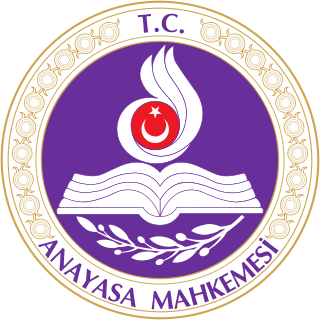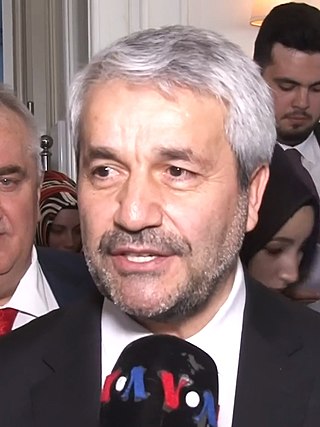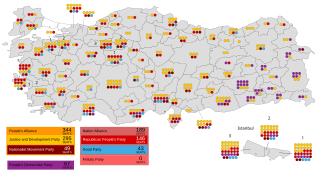| ||||||||||||||||
| ||||||||||||||||
| ||||||||||||||||
The 6th Justice and Development Party Ordinary Congress took place on 18 August 2018 in order to elect a party leader and members to the party congress of Turkey's ruling Justice and Development Party (AK Party). [1]
| ||||||||||||||||
| ||||||||||||||||
| ||||||||||||||||
The 6th Justice and Development Party Ordinary Congress took place on 18 August 2018 in order to elect a party leader and members to the party congress of Turkey's ruling Justice and Development Party (AK Party). [1]

The Justice and Development Party, abbreviated officially as AK Party in English, is a political party in Turkey self-describing as conservative-democratic. It has been the ruling party of Turkey since 2002. Third-party sources often refer to the party as national conservative, social conservative, right-wing populist and as espousing neo-Ottomanism. The party is generally regarded as being right-wing on the political spectrum, although some sources have described it as far-right since 2011. It is one of the two major parties of contemporary Turkey along with the Republican People's Party (CHP).

The Republican People's Party is a Kemalist and social democratic political party in Turkey. It is the oldest political party in Turkey, founded by Mustafa Kemal Atatürk, the first president and founder of the modern Republic of Türkiye. The party is also cited as the founding party of modern Turkey. Its logo consists of the Six Arrows, which represent the foundational principles of Kemalism: republicanism, reformism, laicism (Laïcité/Secularism), populism, nationalism, and statism. It is currently the second largest party in Grand National Assembly with 131 MPs, behind the ruling conservative Justice and Development Party.

Ali Babacan is a Turkish politician, economist, and engineer. He is the founder and current leader of the Democracy and Progress Party (DEVA). He served 13 years as the Minister of Foreign Affairs, Minister of Economy, Chief Negotiator for the EU and Deputy Prime Minister of Turkey from 2002 to 2015. He was a member of the parliament as well.

The Democrat Party was a centre-right political party in Turkey, and the country's third legal opposition party, after the Liberal Republican Party established by Ali Fethi Okyar in 1930, and the National Development Party established by Nuri Demirağ in 1945. Founded and led by Celâl Bayar and Adnan Menderes, it was the first of the opposition parties to rise to power, de-seating the Republican People's Party during the national elections of 1950 and ending Turkey's one party era. The party ″facilitated the resurgence of Islam, especially at the popular level, in Turkey″.

The Constitutional Court of Turkey is the highest legal body for constitutional review in Turkey. It "examines the constitutionality, in respect of both form and substance, of laws, decrees having the force of law, and the Rules of Procedure of the Turkish Grand National Assembly". If necessary, it also functions as the Supreme Criminal Court to hear any cases raised about the President, Vice President, members of the Cabinet, or judges of the high courts. In addition to those functions, it examines individual applications on the grounds that one of the fundamental rights and freedoms within the scope of the European Convention on Human Rights which are guaranteed by the Constitution has been violated by public authorities.

The Court of Cassation, officially called the Supreme Court of Appeals of the Republic of Turkey, is the last instance for reviewing verdicts given by courts of criminal and civil justice in Turkey.

The 2007 Turkish presidential election refers to two attempts to elect the country's 11th president, to succeed Ahmet Necdet Sezer. The most likely candidate for president was Abdullah Gül. Turkey's presidential office is regarded as the guardian of the country's secular system; the fact that Gül's wife wears the Islamic headscarf, as well as his own history in political Islam, turned the elections into a political crisis.

Mehmet Ali Şahin is a Turkish politician. He was the Speaker of the Parliament of Turkey from 2009 to 2011.

Local elections were held in Turkey on 29 March 2009. The overall winner was the ruling party Justice and Development Party, although the party saw a decline in its vote relative to the 2007 general election. The leading opposition party, the social democratic Kemalist CHP, increased its vote share, as did a number of smaller parties including the SP, DTP and BBP, whose party leader Muhsin Yazıcıoğlu had died in a helicopter crash four days before the election. The third largest party, the Turkish nationalist MHP, enjoyed a more modest vote surge. The election was not contested by Cem Uzan's GP. The AKP failed to take certain provinces it had publicly targeted, such as Diyarbakır, İzmir and Urfa, and did not achieve its goal of exceeding 47% of the overall vote. There was localized election-related fighting in southeastern Turkey, in which five people were reported to have been killed and about a hundred injured.

Nihat Ergün is a Turkish politician and the former Minister of Science, Industry and Technology.

General elections were held in Turkey on 12 June 2011 to elect the 550 members of Grand National Assembly. In accordance to the result of the constitutional referendum held in 2007, the elections were held four years after the previous elections in 2007 instead of five.

The People's Voice Party was a religious conservative political party in Turkey. It was founded on 1 November 2010 by Numan Kurtulmuş and dissolved on 19 September 2012.

Süleyman Soylu is a Turkish politician. He is a deputy chairman of the Justice and Development Party. He previously served as the Minister of Labour and Social Security from November 2015 to August 2016 and the Minister of the Interior from August 2016 to June 2023. He is a former leader of the Democrat Party (DP).

The 2014 Extraordinary Congress of the Justice and Development Party was held on 27 August 2014 in order to elect a new leader of the Justice and Development Party, the ruling political party of Turkey. It was the first extraordinary congress in the party's history, necessitated by the election of party leader Recep Tayyip Erdoğan as the 12th President of Turkey. Former Foreign Minister and Konya MP Ahmet Davutoğlu was unanimously elected unopposed as party leader. The congress marked the last public appearance of Recep Tayyip Erdoğan as Prime Minister, as he assumed the Presidency the day after. The congress took place at a time of significant change to Turkish politics, with the opposition Republican People's Party also holding an extraordinary convention on 5–6 September.

Nurettin Canikli is a Turkish politician, the former Minister of National Defense of Turkey and a Member of Parliament for Giresun under the ruling Justice and Development Party. He previously also served as the Deputy Prime Minister of Turkey and the Minister of Customs and Trade of Turkey.
Events in the year 1979 in Turkey.
The Daily Sabah is a Turkish pro-government daily newspaper published in Turkey. Available in English and owned by Turkuvaz Media Group, Daily Sabah published its first issue on 24 February 2014. The editor-in-chief is Ibrahim Altay.

The 2nd Justice and Development Party Extraordinary Congress was a party convention of the ruling Justice and Development Party of Turkey held on 22 May 2016. The congress, announced on 4 May 2016, had been long speculated by politicians and political commentators who had observed a severe deterioration in relations between Prime Minister and incumbent AKP leader Ahmet Davutoğlu and the AKP's founder and former leader, President Recep Tayyip Erdoğan. Davutoğlu announced that he would not stand for re-election as party leader.
The 3rd Justice and Development Party Extraordinary Congress took place on 20 and 21 May 2017 in order to elect a party leader and members to the party congress of Turkey's ruling Justice and Development Party. The party's founder and first leader, Recep Tayyip Erdoğan, was the only candidate for the post, having left the leadership upon his election as President in 2014. Having been initially required to sever his political party relations on grounds of impartiality, a constitutional referendum in 2017 turned Turkey into an executive presidency, allowing Erdoğan to return to the AK Party and become its leader.

Parliamentary elections were held in Turkey on 24 June 2018 as part of general elections, with presidential elections taking place on the same day. Originally scheduled for 27 October 2019, President Recep Tayyip Erdoğan called snap elections on 18 April after months of speculation. With the passage of a series of constitutional amendments in the 2017 referendum, the number of MPs will be increased from the previous 550 to 600. These representatives will be elected by the constituents of the 87 electoral districts of Turkey by party-list proportional representation.